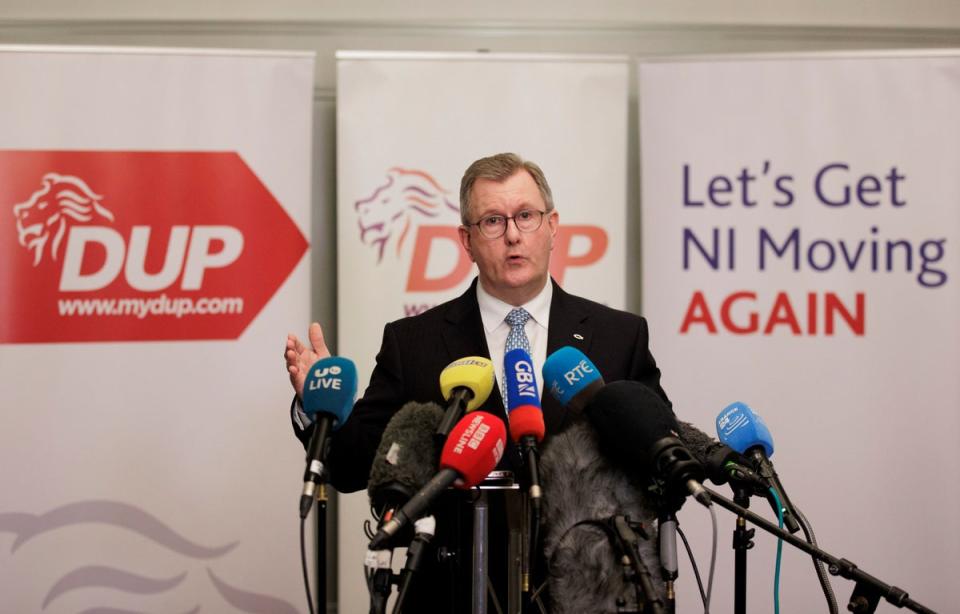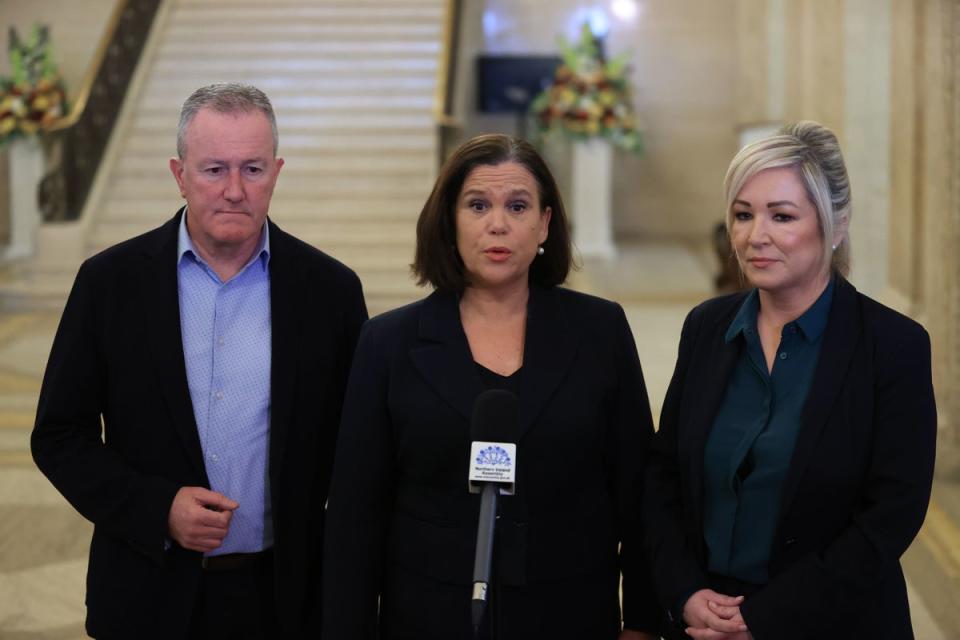No 10 says new £3bn Brexit deal with DUP doesn’t need EU approval
No 10 has said the agreement struck with the DUP to change post-Brexit checks for Northern Ireland will not need Rishi Sunak to reopen his Windsor Framework deal with the EU.
DUP leader Sir Jeffrey Donaldson has claimed the new agreement – which has won the backing of his unionist party – will involve “substantive” changes to trade arrangements.
Sir Jeffrey insisted it would remove all post-Brexit checks on goods moving into Northern Ireland from Great Britain under a deal to restore power-sharing at Stormont.
As well as claiming “zero checks, zero customs paperwork” on goods moving over the Irish Sea, the DUP chief also said Northern Ireland would no longer automatically have to follow EU laws.
Mr Sunak’s Northern Ireland’s secretary Chris Heaton-Harris said the changes were “significant” – but refused to be drawn on the details, and made clear they would not need any approval by the EU.
Mr Heaton-Harris said he would set out the full agreement with the DUP on Wednesday – and revealed that more than £3bn would be spent in Northern Ireland if the parties get back to Stormont.
The DUP, Sinn Fein and other Northern Ireland parties are due to meet later on Tuesday to discuss the next steps to get the executive back up and running after the unionists’ two-year blockade.

Mr Sunak and EU Commission president Ursula von der Leyen agreed a new post-Brexit deal in February 2023 – the Windsor Framework – aimed at reducing checks on Irish Sea trade.
No 10 declined to confirm DUP leader Sir Jeffrey’s claim the new deal would result in “zero checks, zero customs paperwork” on goods moving within the UK.
But Mr Sunak’s official spokesperson said it would not affect the PM’s agreement with Brussels. “It will not change the powers and freedoms we agreed … in the Windsor Framework.”
Mr Heaton-Harris, asked if the Windsor deal would now have to be renegotiated, told broadcasters: “I don’t believe so.”
The Northern Ireland secretary said there were “some significant changes” and the new agreement had achieved “a vast array of decent improvements to make sure our internal market works properly”.
It is understood the Sunak government will introduce two statutory instruments at Westminster on Wednesday so parliament can sanction the DUP agreement – with possible changes to the Internal Market Act, rather than the Windsor deal with the EU.

However, it emerged that the UK and the EU have agreed on a change affecting the movement of some goods between Britain and Northern Ireland. The UK-EU joint committee has formally expanded the category of “not at risk” goods entering Northern Ireland from the rest of the world.
DUP leader Sir Jeffrey pounced on the move, saying it amounted to “legal changes” and shows the “naysayers are wrong”.
But No 10 played down the significance of the change agreed with Brussels, insisting that it was “separate” to the changes agreed with the DUP that would be set out on Wednesday.
Some trade experts believe it would allow Northern Ireland to better benefit from a free-trade agreement secured by the UK government covering agri-food foods such as New Zealand lamb.
Meanwhile, EU chiefs warned against any changes to the Windsor deal. Asked about the new agreement with the DUP, a European Commission spokesperson said officials in Brussels would “examine those texts when the time comes”.
They added: “We’ve said before, we expect the UK government to fulfil its obligations under the [Windsor] framework, as it has been doing.”
Sir Jeffrey expressed the hope that the Stormont institutions could be back up within days after he secured the backing of his party executive for proposals on Monday night.
“Zero checks, zero customs paperwork on goods moving within the United Kingdom,” the DUP leader told BBC Radio Ulster.
Sir Jeffrey later told a press conference that the “green lane” – the planned limited checks on goods moving from GB to NI but staying in the UK – would be scrapped and replaced by the UK’s internal market system.
The DUP leader also claimed the new deal would also end “dynamic alignment” arrangements, where any future EU law changes would have to be followed in Northern Ireland.
Sir Jeffrey announced his support for a Stormont return at a press conference held after 1am on Tuesday morning. He said there was “decisive” backing from the 130-strong party executive after Monday night’s five-hour meeting.

But support for the deal is not unanimous within the DUP, as several senior figures remain fiercely opposed to the proposed agreement to restore powersharing.
Around 50 loyalist and unionist protesters assembled outside Monday night’s meeting, many carrying posters and banners warning against a DUP “sellout”.
Sinn Fein is now expected to take the first minister’s job in a restored ministerial executive, with vice-president Michelle O’Neill lined up for the role.
Party president Mary Lou McDonald said she was optimistic Stormont could return before the deadline of next Thursday (8 February). And Ms McDonald said she was “satisfied” that the new agreement would not undermine existing deals with the EU.
Mr Sunak spoke to his Irish counterpart Leo Varadkar, as the pair shared their hopes that the breakthrough paves the way for the restoration of the executive and the assembly.
Mr Heaton-Harris said he hoped all the parties would agree to the changes. “I believe that all the conditions are now in place for the [Northern Ireland] assembly to return.”
The return of Stormont will also see the Treasury release a £3.3bn package to support under-pressure public services in Northern Ireland. The financial package includes money to settle the demands of striking public sector workers.


